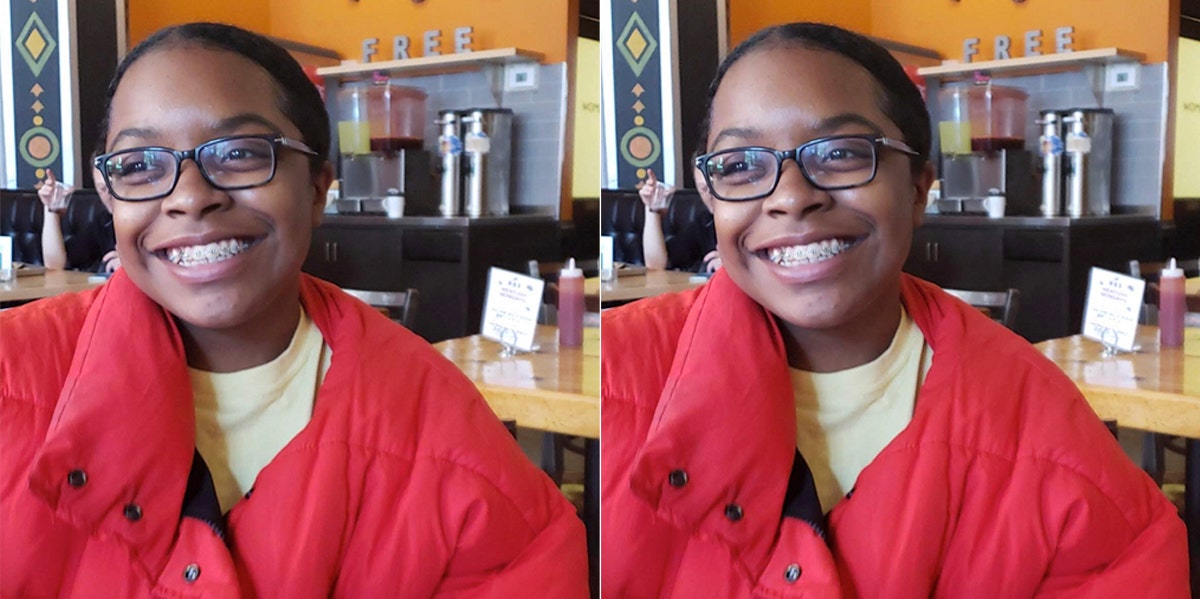I'm A Black Girl Who Loves One Direction And Wears Converse — That Doesn't Make Me "White"
Blackness is not some sort of point system.
 Courtesy of Author
Courtesy of Author Growing up, I never thought too much about my Blackness. In fact, in elementary school, I never thought about race, period.
I figured that was because my school had equal amounts of Black children as white children and back then, being a minority never bothered me, so I never really thought about it.
Until I got to middle school.
Middle schoolers, as people know, can be extremely mean and cruel. I dealt with teasing and a bit of bullying for wearing glasses, having braces, and the fact that I hadn’t gone through puberty like many of my other girlfriends.
Most of that teasing never bothered me, thankfully. But what did get to me was the discovery that many Black people seemed to judge Blackness on a point scale.
I was a heavy One Direction fan in middle school, along with Taylor Swift and Selena Gomez. I didn’t really listen to rap music unless it was on the radio. Of course, I loved Beyoncé, Rihanna, and Mariah Carey, but I was mostly listening to musical artists that other people my age were also listening to.
Some of my classmates asked me why I listened to “white music,” or dressed “like a white girl.” It was confusing because those comments always felt like insults but I didn’t understand why, exactly, they were insulting. I wasn’t white — something anyone could clearly see — and I couldn't comprehend why things like One Direction and Converse sneakers were only reserved for white girls.
So, I started hiding many of my real interests.
I remember going to my first Selena Gomez concert when I was 13. I was beyond excited, but there was also a part of me that didn't want to tell my friends I was going because I didn’t want to be judged for not being Black enough just because I liked to listen to Selena Gomez.
It took me a rather long time to realize that Blackness isn’t some kind of point system.
If I listened to heavy rap music and used African-American Vernacular English (AAVE), I was branded as “ghetto” and “too Black.” If I wore tote bags and listened to Indie music, I was labeled a “white girl.” I felt like I couldn't win, no matter what I did.
Judgments even boiled down to the way I spoke. All throughout high school, people made fun of the way I talked, again, branding me as white or that I “talked white," as if Black people are supposed to always talk in ebonics and broken English.
In retrospect, a lot of the insults and teasing I received from my Black friends and classmates stemmed from internalized racism. This U.S. has such a specific portrayal of what Blackness means and is — and it's been ingrained in the media for a long time.
Black people have always been viewed as unsophisticated. We can’t use proper grammar, we can’t dress a certain way, listen to certain music, or even dance in a certain way because that’s not how we've been historically depicted in films and TV.
But Blackness isn’t unitary. Millions upon millions of Black people exist on this planet, and we're all different. There is no right way to be Black, just as there is no wrong way to be Black.
Loving, living, and expressing my Blackness shouldn’t have to be put on trial, and I hate that it took me until right now — a week before my 21st birthday — to realize I don’t give a damn if people think I’m not Black enough.
I don’t want to surround myself with people who put me down and question an identity that I love with my entire being. If that were the case, I’d rather be alone.
Self-discovery is hard, and having to suffer for so many years at the hands of people in my own community is disheartening.
Coming to terms with my identity is something I battle with every day, whether it’s with my race or with my sexuality. But at the end of the day, if I’m happy in my own skin, that’s really all that matters.
Nia Tipton is a writer living in Chicago. She covers pop culture, social justice issues, and trending topics. Follow her on Instagram.

